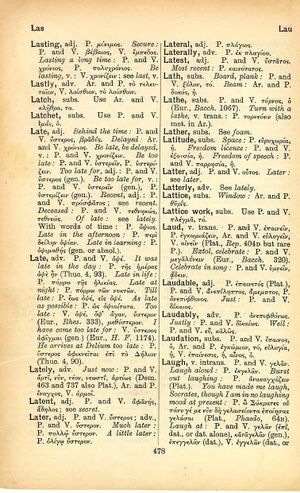laugh
ἀρετὰ γὰρ ἐπαινεομένα δένδρον ὣς ἀέξεται → for virtue that is praised grows like a tree, praised virtue will grow like a tree
English > Greek (Woodhouse)
v. intrans.
P. and V. γελᾶν. Laugh aloud: P. ἐκγελᾶν. Burst out laughing: P. ἀνακαγχάζειν (Plat.). You have made me laugh, Socrates, though I am in no laughing mood at present: P. ὦ Σώκρατες οὐ πάνυ γέ με νῦν δὴ γελασείοντα ἐποίησας γελάσαι (Plat., Phaedo, 64B). Laugh at: P. and V. γελᾶν (ἐπί, dat., or dat. alone), καταγελᾶν (gen.), ἐπεγγελᾶν (dat.), V. ἐγγελᾶν (dat., or κατά, gen.), διαγελᾶν (acc.). Mock: P. and V. σκώπτειν (acc.) (Eur., Cycl. 675 absol.), Ar. and P. χλευάζειν (acc.), ἐπισκώπτειν (acc.), V. κερτομεῖν (acc.); see mock. Simplicity was laughed down and disappeared: P. τὸ εὔηθες . . . καταγελασθὲν ἠφανίσθη (Thuc. 3, 83). Without laughing: use adv., P. ἀγελαστί.

